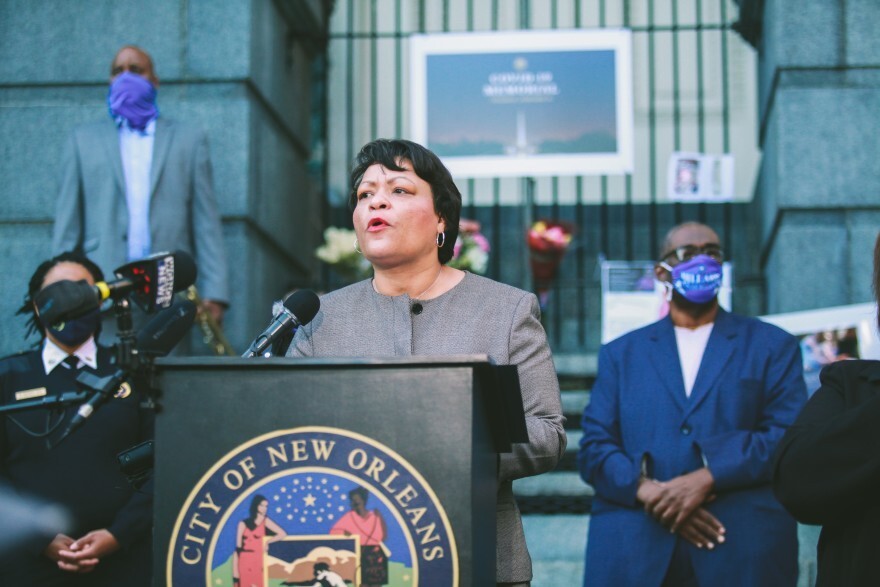After the U.S. Supreme Court overturned Roe v. Wade, Louisiana's leaders and groups reacted to the news — many praising the court's decision, while others condemned the justices for ending the constitutional right to abortion that has been upheld for nearly half a century.
While this decision did not come as a surprise, as a draft of a majority decision to overturn Roe v. Wade was leaked by POLITICO in early May, the official ruling will have immediate consequences. Three states have laws in place that legislators designed explicitly to take effect immediately after the decision came down — otherwise known as trigger laws. Louisiana is one of them.
New Orleans Mayor LaToya Cantrell joined WWNO’s Patrick Madden and the Advocate’s Stephanie Grace to share her reaction and tell us how this ruling might impact Louisianans.
This interview has been lightly edited for length and clarity
Patrick Madden: Thank you for joining Louisiana Considered. Can just give us your initial reactions to this ruling?
Mayor Cantrell: The initial reaction is just one of disbelief. Half a century of women empowered to make our own decisions has just been tossed out. It's unacceptable. It really does speak to a political agenda that's driving this turn of events, and it's something absolutely that we have to just keep fighting. We cannot give up. I think of women who are here now, women of the future, our children, our daughters. So we have to continue to stand and push back against these political agendas that are actually taking us back and not moving us forward.
Stephanie Grace: Mayor, I'm wondering, what does that look like? What weapons do you have left in order to fight this?
LC: Well, the weapons that we have are the ones that we are so accustomed to. And one is women sticking together, women being that voice, women empowering women to not only work together, but stand together to fight. We've made this progress not alone, and so we're going to have to continue to organize ourselves and be the voices our daughters need us to be for generations. We have to continue because individuals will be voted out. Hopefully, things will change. As we know, things will always change. And we definitely did not expect to step a step backwards.
I believe that if we continue to work together to stand up for our rights that we know that we deserve, then hopefully in the future we will see a change for the better. A change that pushes us into a future that is bright for all families, for all women, and for future generations.
SG: I know this announcement just came down, but is there anything specific that you think that the administration might do or even that the district attorney might do in response to this?
LC: The only thing that I really would have to offer is just staying focused on bodily harm. The lack of women being able to choose for themselves, the lack of women being able to work with their own healthcare providers on decisions that impact them, and the harm that this is causing. I think that will allow us to push back as we need to collectively. But this is a black eye for the United States of America.
Outside of the country, outside of the U.S., they're upholding the rights of women that we cannot get back today in our own country. It's embarrassing. It's a slap in the face. It's disheartening. It's very dangerous. And so we have to stand. We have to do what women have always done in the face of any adversity or any challenges that cause us harm. We stand and we fight and we do make progress.
And so this is just one of those blows that will not knock us down. And in spite of it, I refuse to be defeated. I refuse to sit down, but continue to stand for what I know that I deserve as a woman. All women and our children and our girls deserve this level of protection.
Stephanie Grace: In a lot of states, this is kind of a Democrat-Republican issue. You’re in Louisiana, you're a Democrat and you're a known pro-abortion rights Democrat, but there are quite a few Democrats who are on board with the restrictions. Like in the legislature and the governor.
Do you see that changing now that it's kind of a reality? Do you see people looking at the circumstances of the constituents and shifting at all? Or do you think that's really locked in here?
LC: This ruling just reopens the back alley business, and this is what we are seeing. You talk about Democrats versus Republicans, but I'm a mayor, and mayors stand for everybody. So, bipartisan is how I have to stand in creating and ensuring that balance. But I think the focus has to also be on who we elect and electing the right people who will stand for all human rights. And what we're seeing now — even in my own state with our governor making and supporting these types of decisions — it just doesn't align with where we need to be for our future and health care and human rights.
We're no longer protected. And the individuals that are siding with this who are Democrats are really demonstrating that they're not with us either.




